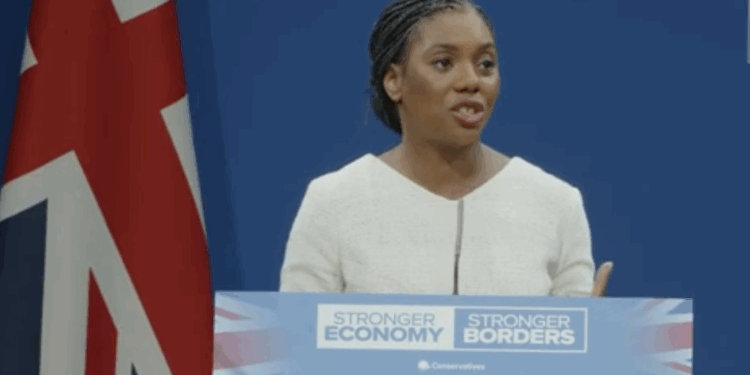Another scalping is coming, Tories believe – in the shape of Jonathan Powell. Senior figures at Tory conference said they believe the row over the national security adviser suppressing an investigation into Chinese spying could see yet another Starmer appointment fall under pressure, amid a concerted plan of action from the Party. The latest in a string that has already included Angela Rayner and Peter Mandelson.
One shadow cabinet minister says their sights are set “even higher” than Powell: “We’re looking at his boss as well.” Hitting Labour every day, in every way, is something that will always go down well within the Conservative Party – and some senior MPs believe that fight hasn’t been so clear in everyday operations.
But just as they know a Labour scalping gives them an internal boost, LOTO and Kemi Badenoch are aware that it is not something they can rest their laurels on. They do not want to build a shallow support base in the way the Labour Party did, hoovering up votes simply because they weren’t the Tories – they want to stand for something and have a story to tell.
When Kemi Badenoch addressed the party at last year’s conference, her promise was straightforward: take our time, build the policies, then start winning. Twelve months on, in her first as leader, she has begun to fulfil that mandate, with announcements on everything from leaving the ECHR to repealing the Climate Change Act. An MP who had demanded “rabbits out of hats” left Manchester telling me, “well, there you go.”
For months her team had tried to steady jittery colleagues with precisely this – visible evidence that the Tories were back in the business of ideas. On that count, the conference was a success. But the bigger anxiety remains: policies are one thing, a narrative quite another. What do the Conservatives stand for?
At fringe events and in the hotel bars, the answers converged on a single theme: the economy. Yes, immigration matters, but mostly because of its economic drag on wages and public services. As one MP told me, voters think Britain is doing “human quantitative easing.” Research suggests there is fertile ground for a Tory revival: on reducing the national debt, keeping taxes low, creating jobs and handling the economy, the Conservatives remain more trusted than Labour or Reform. Labour does better only on a couple of factors around public services and workers’ rights. Reform, for all its noise, has no lead at all.
Her closing speech tried to prove just that, setting out an “engineer’s mandate” to remake the state. It went down a treat both with party members, her MPs and splashing most of the newspapers. There was a promise to reverse Labour’s tax rises on employers, farmers and private schools; to scrap its new rules on workers’ rights; and to lop £47 billion from spending, with cuts to Whitehall, foreign aid and welfare.
A new fiscal “golden rule” was promised to reduce the deficit, cut taxes and boost growth; to limit British benefits to British citizens; and to partially abolish stamp duty. It has not only given the party something distinct to say, but the announcement on stamp duty is a clear sign of having listened to their MPs who, as I wrote previously, have been pushing on this.
Nigel Farage, whose economic programme involves nationalisation and higher welfare, was mentioned only in passing by Badenoch. In Kent, Reform’s councillors have just voted for a 5 per cent council tax rise. For all the noise about “real conservatism,” Badenoch can claim the economic high ground.
Her shadow Treasury team seemed excited – shooting from the hip almost every day in Manchester, although not all their ideas have been confirmed as party policy. Mel Stride mused aloud that, were he in Rachel Reeves’s shoes, he would raise income tax. Richard Fuller suggested means-testing the state pension, while Mark Garnier toyed with scrapping stamp duty on shares. It was backbencher Tom Tugendhat who went further and addressed the policy few really want to touch: the triple lock, branding it “unsustainable.”
Badenoch has instead been defending the policy, telling the Daily Express: “We’ve always protected it and we stand by it.” To preach economic competency while keeping the triple lock? Make it make sense… It is a missed opportunity. A truly radical stance – accepting that Britain’s ageing demographics make the triple lock impossible to maintain – might have cut through. Instead, the Tories are left trying to square the circle of fiscal conservatism and extreme pensioner protection. Voters need to be able to trust the party more on the economy, but that trust risks withering if they see contradiction.
The think tank Onward’s Becoming Blue report underscored the point. Just 13 per cent of under-40s say they intend to vote Conservative, yet many instinctively support Tory economics; far more agreed that “government should cut taxes and redistribute less income” than “government should increase taxes and redistribute more income.” The Tory vote base is unsustainable: one in eight of their voters at the last election are expected to die before the next. Policies that look to build a new base should be prioritised.
Even if Badenoch restores economic credibility, the scale of the rebuilding required is immense. In Scotland and Wales, extinction looms in May. In England, rumours swirl of potential Tory wipeouts in counties once thought unassailable. “If they lose Hampshire, it’s game over,” one veteran MP told me, only half-joking. The chatter of letters going into the 1922 calling for Badenoch’s resignation has calmed — for now. “There is certainly no mood to change right now,” a shadow cabinet minister tells me. But it is the public noticing and choosing to care that would really save her.
There are signs of thaw. A year ago, 21 per cent of former Tory voters swore they would never return. Today the figure is 12. The trouble is that some of her introduction to the electorate has already been squandered. New leaders get one shot at defining themselves before the daily grind erodes their shine – and Badenoch’s first months were oddly muted. A more ruthless politician would have used their first few weeks and months to flood the airwaves, telling voters exactly who she was. Now she has to keep momentum the hard way – through sheer repetition of principles and a defined narrative.
For now, the conference has bought her some relevance. That matters: for the last year, Labour and Reform denied her even that dignity. But the Tories must turn a handful of economic polling advantages into a coherent case for government. Only then will voters believe not just that Labour’s model has failed, and that they are wary of Reform, but that the Conservatives have something better to offer.
And as gossip continues about Robert Jenrick’s leadership ambitions – his allies bristle at suggestions he may be “Burnham-ised” out of the limelight – one thing remains clear: the Conservative Party may have survived this conference intact. But survival is not the same as revival.








![Florida Officer Shot Twice in the Face During Service Call; Suspect Killed [WATCH]](https://www.right2024.com/wp-content/uploads/2025/12/Inmate-Escapes-Atlanta-Hospital-After-Suicide-Attempt-Steals-SUV-Handgun-350x250.jpg)

![Keith Ellison Caught Promising to Fight State Agencies for Somali Fraudsters [WATCH]](https://www.right2024.com/wp-content/uploads/2026/01/Keith-Ellison-Caught-Promising-to-Fight-State-Agencies-for-Somali-350x250.jpg)






